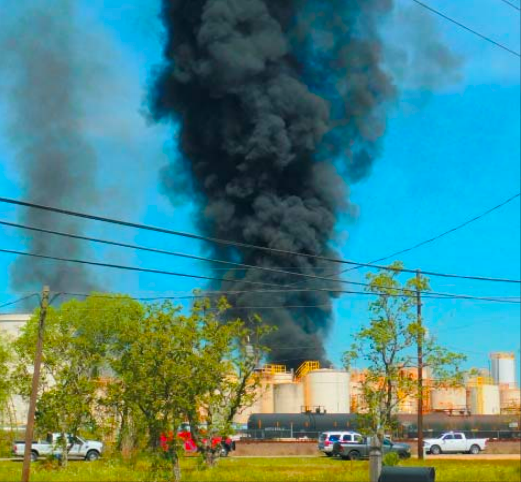

Deadly Fire At Crosby Chemical Plant Raises Legal And Safety Questions
HARRIS COUNTY – Texas Attorney General Ken Paxton has filed a petition against KMCO alleging violations of the Clean Air Act, but KMCO’s legal issues don’t end there.
Last Tuesday’s explosion at a KMCO chemical plant in Crosby, Texas killed one and injured two.
Separate from Tuesday’s explosion and fire, KMCO is currently in violation of the Clean Water Act, and has had a host of other recent offenses, including violations of the Clean Air Act and a hazardous waste statute, the Houston Chronicle reported.
Tracey Hester of the University of Houston Law Center said that a facility’s record plays into the potential liability it may face in the wake of a disaster.“Just speaking generally, absolutely — a facility that has a record of prior violations, particularly the same kind of violations, escalates its legal exposure,” Hester said. “At the very least, most statutes provide that repeat violations have bigger potential penalties associated with them.”
Facilities with a history of violations have a harder time renewing the permits they need to operate and must face more inspections from regulators, according to Hester. That history could also play into potential criminal charges against decision-makers at KMCO.
“At the end of the day, it is very clearly — on both the federal and state levels — a major factor in deciding whether to bring a criminal action,” Hester said.
Safety concerns
Tuesday’s explosion also raised questions regarding safety protocols. “Major chemical incidents like this can be prevented by applying process safety management principles,” said Rachel Meidl, a fellow in Energy and Environment at Rice’s Baker Institute. She said the Occupational Safety and Health Administration is the main entity tasked with protecting workers.
OSHA outlines 14 principles in total. Some of those principles include documented operating procedures, adequate training for both employees and contractors, and process hazard analysis — when engineers predict what might happen during a failure.
KMCO worker Randy Villalobos told ABC13 that he didn’t hear any announcements or alarms. Instead, an operator told him to get out. And when he finally got to the fence, he had to crawl underneath. The gate was locked.According to Meidl, that shouldn’t happen.
“There are elements of the process safety management system that would catch that, so clearly there was a breakdown,” Meidl said.
The US Chemical Safety Board is investigating the incident. After an investigation, they issue recommendations for the industry as a whole to help prevent similar disasters.

